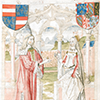Political Ideology and the Rewriting of History in Fifteenth-Century Flanders
DOI:
https://doi.org/10.18352/bmgn-lchr.10557Keywords:
Flanders, late medieval historiography, cultural memory practices, réécriture, revolt against Maximilian of AustriaAbstract
Medieval views on rulers from the past were often politically instrumentalised in the service of contemporary interests. In the recent historiography on medieval Flanders, the reconstruction of how ‘historical truth’ changed over time to cater for topical needs has primarily been examined from the perspective of ‘social’ or ‘communicative’ memories, which were orally transmitted over a short period of time. This line of research followed the dominant ‘communicative memory’ – paradigm. However, historians have paid far less systematic attention to the question how urban elites and state officials used histories that went farther back in time and dealt with the ‘high politics’ of princes and rulers to assert (rebellious) political ideologies of the moment. In this vast topic of research, historians are dealing with histories that were transmitted through manuscripts and not through oral communication. Instead of relying on the ‘communicative memory’ – paradigm, which allows historians to consider how the recent past has been ideologically reconstructed, this article examines how late fifteenth century Flemish urban elites rewrote, interpolated, deformed and manipulated histories from a more distant past to shape a functional ‘cultural memory’ (in the sense of Jan Assmann’s definition) that influenced a society’s ideological vision on history. Taking the political speech of Willem Zoete (1488) and the late fifteenth-century popular and widespread Flemish historiographical Middle Dutch corpus, the Excellente Cronike van Vlaenderen, as a starting point, this article shows how rulers from the past served as a vehicle to express contemporary rebellious ideas against the regency of Maximilian of Austria, and how ideologicalmotives and discursive strategies were deployed to advocate the ideology of the ‘political contract’ between the prince and his subjects, as well as the idea of the ‘natural prince’.
Middeleeuwse opvattingen over vorsten uit het verleden werden vaak politiek geconstrueerd in functie van eigentijdse belangen. Uit de recente historiografie over middeleeuws Vlaanderen blijkt dat historici de manier waarop de ‘historische waarheid’ door de eeuwen heen werd ge(re)construeerd voornamelijk vanuit het perspectief van ‘sociale’ of ‘communicatieve’ herinneringen hebben onderzocht. Deze benadering past binnen het dominante theoretische model van ‘communicatieve herinnering’, waarbij de focus ligt op herinneringen die binnen de korte tijdsspanne van enkele generaties en voornamelijk mondeling werden overgeleverd. Tot nu toe is er veel minder aandacht besteed aan hoe stedelijke elites geschiedverhalen over de politieke daden van vorsten uit een verder verleden hebben gebruikt om actuele (opstandige) politieke statements te maken. In dit onderzoeksdomein staan geschiedverhalen centraal die veeleer schriftelijk dan mondeling werden overgeleverd. Anders dan in het heersende model van ‘communicatieve herinnering’, onderzoeken wij in dit artikel hoe de laatmiddeleeuwse stedelijke elite in Vlaanderen de geschiedenis uit een ver verleden herschreef, vervalste, vervormde en manipuleerde in functie van de constructie van een ‘culturele herinnering’ (in de definitie van Jan Assmann), die van invloed was op de eigentijdse ideologische visie op het verleden. Aan de hand van een analyse van de politieke redevoering van Willem Zoete (1488) en het bekende, laat vijftiendeeeuwse Middelnederlandse historiografische corpus, de Excellente cronike van Vlaenderen, wordt getoond hoe geschiedverhalen over vorsten uit een ver verleden werden ingezet om zich tegen het actuele regentschap van Maximiliaan van Oostenrijk te verzetten, en hoe ideologisch geladen discursieve strategieën daarbij werden ontplooid om de gangbare opvattingen over zowel het ‘politieke contract tussen de vorst en zijn onderdanen’ als ook over de ‘natuurlijke vorst’ te verdedigen.
Downloads

Published
Issue
Section
License
Authors who publish with this journal agree to the following terms:
a) Authors retain copyright and grant the journal right of first publication with the work simultaneously licensed under a Creative Commons Attribution 4.0 International (CC BY 4.0) that allows others to share the work with an acknowledgement of the work's authorship and initial publication in this journal.
b) Authors are able to enter into separate, additional contractual arrangements for the non-exclusive distribution of the journal's published version of the work (e.g., post it to an institutional repository or publish it in a book), with an acknowledgement of its initial publication in this journal.
c) Authors are permitted to post their work online (e.g., in institutional repositories or on their website) prior to and during the submission process.
Authors are explicitly encouraged to deposit their published article in their institutional repository.








